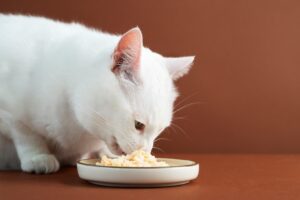Cat nutrition is essential to ensuring your feline companion lives a long, happy, and healthy life. In this comprehensive guide, we’ll explore the crucial nutrients cats need, the importance of a balanced diet, and tips for selecting the best food for your furry friend.
Why Proper Nutrition Matters for Your Cat
Cats are graceful and independent creatures, but their health depends heavily on the nutrition they receive. Providing them with the right diet is crucial to their well-being, vitality, and longevity.
Understanding Your Cat’s Nutritional Needs
As obligate carnivores, cats need a diet primarily made up of meat.Cat nutritional requirements are unique and differ from those of humans and other animals. Essential nutrients include:
- Protein: Vital for energy, muscle growth, repair, and maintenance. Cats need a high-protein diet to thrive.
- Fats: Provide essential fatty acids for healthy skin, a shiny coat, and proper reproductive function. Fats also help absorb essential vitamins and minerals.
- Carbohydrates: Though not as critical for cats, carbohydrates can provide extra energy and fiber.
- Vitamins and Minerals: Key vitamins and minerals include Vitamin A (for vision), Vitamin D (for bone health), calcium (for strong bones), and taurine (for heart health).
The Importance of a Balanced Diet
A balanced diet ensures that your cat receives the right amount of essential nutrients. When selecting commercial pet food, choose brands that meet the standards set by the Association of American Feed Control Officials (AAFCO) to guarantee balanced nutrition.
Factors to Consider When Choosing Cat Food
Selecting the right cat food involves evaluating various factors that affect your cat’s health:
- Age: Kittens, adults, and senior cats have different dietary needs. Choose food specific to your cat’s life stage.
- Activity Level: Active cats require more calories and nutrients compared to more sedentary pets.
- Health Conditions: Cats with medical issues such as kidney disease or allergies may need specialized diets. Consult your vet for personalized recommendations.
- Ingredients: Look for high-quality protein sources like chicken, fish, or turkey. Avoid foods with excessive fillers or artificial additives.
Homemade Diets: Pros and Cons
Some pet owners opt for homemade diets, but it’s essential to consult with a vet before making this decision. Ensuring a homemade diet meets all of your cat’s nutritional requirements can be challenging, and mistakes can lead to deficiencies and health problems.

Common Nutritional Mistakes and How to Avoid Them
Mistakes in feeding your cat can negatively impact their health. Common errors include:
- Overfeeding: Leads to obesity, increasing the risk of diabetes, joint issues, and other health complications.
- Underfeeding: Can cause malnutrition and weaken your cat’s immune system.
- Feeding Table Scraps: Human food may be harmful and cause digestive issues or obesity in cats.
- Ignoring Special Dietary Needs: Failing to provide specific diets for kittens, adults, or senior cats can compromise their health.
Tips for Maintaining Your Cat’s Nutritional Health
Here are practical ways to ensure your cat stays healthy:
- Consult a Veterinarian: Regularly check in with your vet about your cat’s diet and any concerns you may have.
- Provide Fresh Water: Always make sure your cat has access to clean, fresh water.
- Monitor Food Intake: Keep an eye on your cat’s eating habits and adjust portions if necessary.
- Avoid Sudden Dietary Changes: Transition to new food slowly to avoid digestive issues.
- Regular Vet Check-ups: Schedule regular health check-ups to address any dietary or nutritional concerns early on.
Don’t Skip Routine Veterinary Checkups
Regular checkups are vital for detecting potential health issues early and ensuring your pet is on the right track. At King Road Animal Hospital, we encourage all pet owners to schedule regular appointments with our friendly staff to ensure their cat’s health and nutrition are optimized.
By feeding your cat a balanced and nutritious diet, you’re taking a crucial step toward maintaining their overall health and well-being. Following these guidelines will help your feline friend enjoy a long, happy, and fulfilling life.

